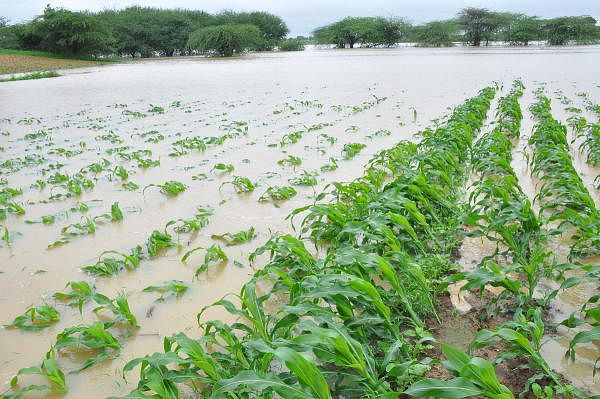From missing its agriculture disbursement target for three consecutive years to the production taking a hit, various developments indicate a steady undercurrent of agricultural crisis in West Bengal.
The country's largest rice-growing state has four major agro-climatic zones: Gangetic alluvial, Terai alluvial, lateritic and coastal saline. The per capita agriculture landholding in the state is 0.64 hectare. These small farmers get caught in the vicious cycle of debt, irrespective of crop damage or bumper crop, due to the lack of adaptation and coping capacities. While a bad crop leaves them with no yield, excess production results in a glut in the market decreasing the price.
Unavailability of institutional credit in required quantity and for the required duration plays a major role in the current situation. This forces them to take loans with high-interest rates from local moneylenders. A recent NABARD study shows the overdependence on private moneylenders is pushing a majority of the farmers into financial crisis.
“In spite of various government agencies making inroads into rural areas, local moneylenders called Mahajans and other non-institutional credit sources have a significant presence in the financial market,” stated the NABARD report titled Doubling the Farmers’ Income by 2022: Issues and Strategies for West Bengal.
With nearly 50% of agricultural land in West Bengal being dependent on rainfall, irregular rainfall has added to the farmers' plight in the state. According to India Meteorological Department, till August the rainfall deficit in West Bengal was 48%. This has increased the possibility of crop damage which may push farmers further into debt.
As for agricultural land covered under irrigation, the small and medium farmers do not have the financial capacity to pay for the high price of electricity for submersible pumps resulting in more debt burden for them.
Failure of populist schemes
In spite of being ruled for over four decades by governments considered to be pro-farmer, the administration has failed to implement government assistance schemes for farmers. West Bengal Chief Minister Mamata Banerjee in January announced two crucial schemes for farmers.
First, she announced a 100% premium for crop insurance in a bid to ensure farmers don’t become indebted either to banks or private lenders. The second was the Krishak Bandhu scheme through which the state government provides Rs 5,000 per acre twice a year to farmers between the age group 18 and 60 years.
However, despite all the fanfare and setting a high target of enrolling 72 lakh farmers as beneficiaries, so far only about 40 lakh have enrolled in the Krishak Bandhu scheme. The government is silent on the extent of debt burden on farmers.
This brings the focus on the contentious issue of farmers’ suicide in the state mainly due to debts and financial loss resulting from a bumper harvest of potato.
Although the Trinamool Congress (TMC) government has consistently denied suicides due to agricultural problems, there have been several instances when family members of deceased farmers as well as the Opposition have claimed that these suicides were indeed due to debt burden or loss resulting from a low price for crops.
“From 2011 till now the number of farmers who committed suicide for being unable to repay loans is 215,” Amal Halder, a senior leader of Krishak Sabha, told DH. The Krishak Sabha is the farmers’ wing of CPM in Bengal.
He accused the TMC government of not paying enough attention to buy crops directly from farmers and hence pushing them further into the clutches of private lenders.
“In situations of crop damage or not getting adequate price in the market, they have no option but to go to private lenders. They are mostly potato and paddy farmers,” said Halder.
However, Minister of State for Agriculture Asish Banerjee denied the phenomenon of farmers’ suicide in West Bengal. “Not even a single such case has taken place in the state,” he said.
